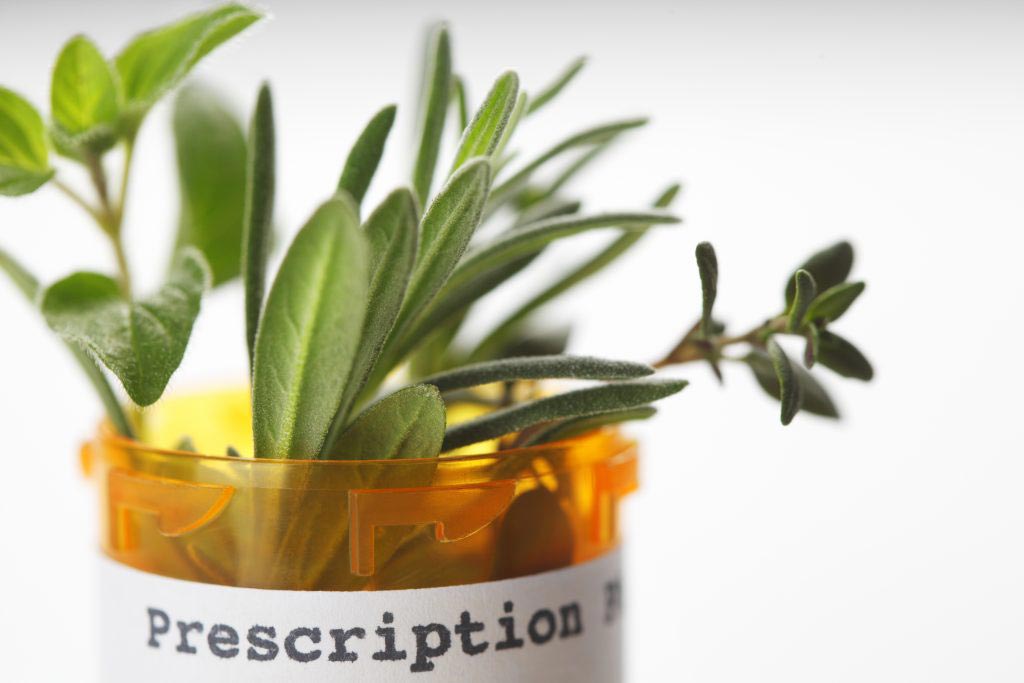Prostate supplements are used to help, maintain and improve the health of the prostate gland in men as they age. The prostate is a tiny muscular gland in the male reproductive system that makes most of the semen fluid. It surrounds the urethra and helps push semen through your penis as you climax.
Prostate supplements are most commonly used to treat benign prostate hypertrophy or BPH. The exact cause of BPH is unknown; however, changes in male sex hormones that come with aging may be a factor (1).
Best Prostate
1. VitaBalance Prostate Plus
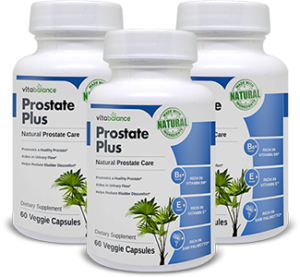
VitaBalance Prostate Plus is made with modern and traditional ingredients, and is engineered to provide the best nutrients to support prostate health. The combination of vitamins, minerals and herbal extracts found in Prostate Plus may support healthy bladder function, healthy urinary flow, and the overall health of the prostate.
These vitamins and minerals include saw palmetto, red raspberry powder and 3 different Japanese mushroom extracts. VitaBalance Prostate Plus is also free of any artificial flavors and preservatives. For these reasons, it’s our #1 pick.
2. Prostate Support + By Nuzena

The Prostate Support+ natural formula includes saw palmetto, Juniper Berries, zinc, cat’s claw and many more. It has been developed by a team of health professionals and backed by tons of science and studies to ensure potency.
Nuzena makes all its products in an FDA registered facility, and this formula is non-GMO, gluten-free, and made with all natural ingredients.
3. New Vitality Super Beta Prostate P3 Advanced
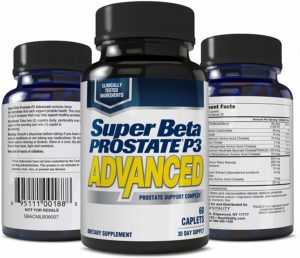
New Vitality Super Beta Prostate shines by including 250mg of Beta-Sitosterol which supports optimal urinary flow. The formula contains other natural ingredients such as 100% of your daily vitamin D requirements along with zinc and calcium.
It also includes 15mg of lycopene. Preliminary research suggests that 15 mg of lycopene may help support healthy prostate size.
4. NOW Clinical Strength Prostate Health

Clinical Strength Prostate Health features superior ingredients including Saw Palmetto Extract, Lycopene and Beta-Sitosterol at clinically effective dosages, making it a very effective supplement.
It also provides additional nutritional support with Zinc, Selenium and Vitamin D-3, which are known to play important roles in optimal prostate function. NOW ensures quality adheres to both mandatory U.S. FDA Current Good Manufacturing Practices (CGMP) regulations and voluntary Natural Products Association (NPA) Good Manufacturing Practices (GMP) regulations.
5. Alpha Rise Ultimate Prostate Support

Alpha Rise contains an abundance of prostate health essentials plus a blend of saw palmetto (600mg) and pygeum (300mg)with pumpkin, burdock root, marshmallow root, zinc, b6, along with other herbs and vitamins to make it a highly rated prostate health complex.
Their manufacturing facilities have been put through rigorous testing, inspections, and certifications and are completely certified by the Food and Drug Administration with Good Manufacturing.
6. UltaLife UltaMan Advanced Prostate

This fast-acting formula by UltraLife supports a blend all-nature herbs that work together to decrease frequent bathroom trips and improve overall prostate health. UltaLife’s Proprietary Formula includes nature’s Saw Palmetto known for its prostate and urinary health benefits as well as being a natural DHT blocker to help decrease hair loss.
The blend also contains Beta-Sitosterol, Pygeum, Lycopene plus 26 powerful herbs & extracts targeted to aid the most frustrating, embarrassing & painful issues men face due to age-related low testosterone levels & growing prostate.
7. Terapeutics ProstatePro

Terapeutics ProstatePro is a natural, safe and effective prostate support complex made of vitamins, minerals and 2 proprietary trademarked formulas including the clinically studied natural plant ingredient proven beneficial for prostate health, Beta-Sitosterol.
Another key ingredient in the ProstatePro blend is the Saw Palmetto Berry Extract which not only supports prostate health but acts as a libido booster. It can also block enzymes that convert testosterone to DHT.
8. Nature’s Craft Prostate Support
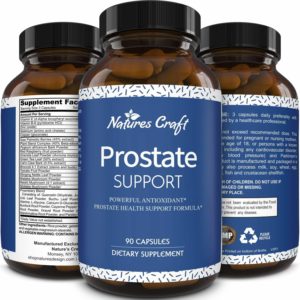
Nature’s Craft fast dissolving capsules contain rich servings of Green Tea, Saw Palmetto Berries, Cat’s Claw, Plant Sterols, Pygeum Africanum, and Zinc as well as vitamin E & B6 to support your prostate.
Natures Craft supplements are made in the USA by GMP certified laboratories, using ingredients sourced from trusted suppliers.
9. Swanson Saw Palmetto
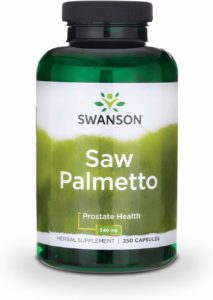
Swanson Saw Palmetto contains exactly 540mg of pure Saw Palmetto Berry. Saw palmetto’s active ingredients are plant sterols, fatty acids and flavonoids that promote lower levels of enzymes that have been linked to prostate health concerns, hair thickness and overall men’s health.
Swanson facilities are Good Manufacturing Practice (GMP) certified, and our purity and potency testing includes independent third-party labs.
10. Ben’s Total Health For Prostate
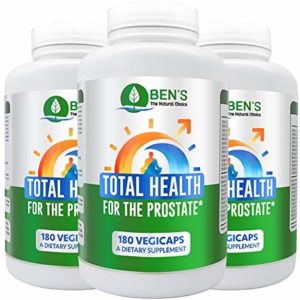
Ben’s Total Health for the prostate helps to actively shrink the prostate gland and contains 23 all-natural ingredients, including Beta Sitosterol, Quercetin, and Vitamin D in clinically significant doses. They also use 100% natural, plant-based vegicaps which are easier to swallow.
Total Health is manufactured in a GMP accredited and FDA authorized facility in the USA. Their products undergo independent, third party US-based laboratory testing to ensure the highest quality, safety & effectiveness.
How We Rank
When looking for the most effective prostate support supplements we wanted to rank the products that boasted only natural ingredients. Moreover we prioritized those supplements that included beneficial extras such as vitamins and minerals to support overall health too. Saw Palmetto is a key ingredient which is vital to prostate health. It is enriched with valuable nutrients that can provide fatty acids to support a healthy body. And now you can benefit from the revitalizing Saw Palmetto choosing one of these supplements.
Vita Balance Prostate Plus formula had made it to the top of our rankings due to its huge popularity. Prostate Plus, like many of the other choices in our rankings is made with natural, modern and traditional ingredients that bring a number of benefits already described.
When choosing each supplement for the rankings it was important each one supported a blend all-nature herbs that work together to decrease frequent bathroom trips and improve overall prostate health. Prostate supplements in our rankings can even significantly help to improve sexual health when taken as directed.
Benefits
1. Saw palmetto may help treat BPH, and its symptoms. A 2013 multicentric clinical pilot trial published in Physiotherapy Research had eighty-two patients take one capsule of 320 mg saw palmetto extract daily for 8 weeks. At the end of the study, it was concluded that saw palmetto decreased symptoms of BPH (2).
A year-long study found that saw palmetto was more effective than finasteride in treating excessive nighttime urination. It was less effective in treating other symptoms related to BPH (3).
A 2016 review only included trials with a special standardized extract of saw palmetto called Permixon. Permixon was effective in improving urinary symptoms of BPH compared to placebo (4).
However, some research seems to say that saw palmetto is ineffective at treating BPH.
A study in 100 men aged 45 and older found no difference in treating BPH after 72 weeks of saw palmetto (5).
Another study of 2,008 men found that 72 weeks of saw palmetto was no more effective than a placebo in the treatment of BPH (6).
2. Saw palmetto may help treat lower urinary tract symptoms (LUTS). LUTS is a range of symptoms that include excessive nighttime urination (nocturia), incomplete bladder emptying or painful urination.
A 2014 study involving 225 patients showed that 12 months supplementation with a combination of saw palmetto along, lycopene, selenium, and tamsulosin (a drug commonly used to treat symptoms of BPH) was effective in the treatment of LUTS (7).
A study in 85 men with LUTS found that saw palmetto given over 24 weeks was more effective in improving symptoms than placebo (8).
Saw palmetto extract significantly decreased the number of nighttime urinations compared to a placebo and two other drugs used to treat excessive nighttime urination in 922 men with LUTS (9).
3. Saw palmetto can reduce the risk of prostate cancer. A study found that saw palmetto berry extract prevents prostate cancer growth by increasing p53 protein production (10).
Another study found that blocking 5-reductase saw palmetto extract is able to decrease the growth of prostate cancer cells (11).
However, a long-term study found no association between the consumption of saw palmetto and the risk of developing prostate cancer (12).
4. Saw palmetto may improve sexual function. Saw palmetto has traditionally been used to treat erectile dysfunction and improve sexual function (13).
A pilot trial showed a significant increase in sexual function in 82 men aged 30 and older (14).
Note: This study was funded by the manufacturer of the brand of saw palmetto used (Prostasan).
Another study found no significant difference between saw palmetto and a placebo in treating sexual dysfunctions (15).
5. Stinging nettle may be effective at improving the symptoms of an enlarged prostate. A review of several studies showed that stinging nettle extract is effective at improving the symptoms of an enlarged prostate, with a low risk of negative effects and toxicity (16).
In a study of 246 BPH patients, a special extract of stinging nettle was safe and effective in treating prostate enlargement when compared to placebo (17).
In another 6-month study of 558 people, stinging nettle was significantly better at improving prostate size and residual urinary volume (18).
Additionally, another study combined stinging nettle and saw palmetto extract. It was as effective as the prescription drug finasteride, which is used to treat enlarged prostates. It was also better tolerated (19).
A 2015 study on adult male rats found that stinging nettle root extract, when taken for six weeks, was able to prevent some of the effects of BPH (20).
6. Chasteberry may help treat an enlarged prostate Enlargement occurs when cells of the prostate gland begin to multiply increasingly, eventually causing a noticeable size difference.
Prostate cancer can occur once the prostate gland cells begin to multiply out of control. In the lab, extracts of chasteberry reduced the growth of cells and even stimulated the death of prostate cells, indicating that chasteberry may be useful for the prevention and/or treatment of benign prostatic hyperplasia and human prostate cancer (21).
7. Pygeum has anti-cancer cell benefits. In a study in mice, pygeum extract reduced the growth of two cancer cell lines and decreased the incidence of prostate cancer (22).
The blood of a man who had taken pygeum extract activated a set of genes that reduced the growth of two human cancer cell lines (23).
In a cell study (human prostate cancer cells), a compound isolated from pygeum bark (atraric acid) bound to their male sex hormone receptor and prevented its activation. As a result, the cells could neither grow nor invade other tissues (24).
8. Pygeum can help bladder emptying and urine flow. According to a 2015 review published in the Canadian Journal of Urology, pygeum can help with urine flow (25).
In an open-label trial (both the patients and the researchers knew which treatment was being used) on 47 patients with long-term prostate inflammation, 42 were healed after taking pygeum extract (100 mg/day) for 5-7 weeks (26).
In another open-label study on 18 patients suffering from long-term prostate inflammation, intake of pygeum extract (200 mg/day) with or without antibiotics for 60 days improved all the urinary parameters measured (27).
The daily intake of a preparation combining the extracts of pygeum (15 g dry stem), saw palmetto (660 mg dry leaf), and hoary willowherb (500 mg dry herb), as well as different plant oils, reduced urination frequency for 3 months (28).
9. Beta-sitosterol can improve the strength of urine flow. Beta-sitosterol is a mixture of cholesterol-like substances called sitosterols or phytosterols, taken from different plants. A 2013 review looked at 11 studies which concluded that beta-sitosterol can relieve urinary symptoms of BPH, including the strength of urine flow (29).
10. Rye grass pollen extract can help with frequent nighttime urination. A review of herbal studies published in BJU International, involving 444 men, found that in one study, men who were taking rye grass pollen extract reported an improvement in their nighttime symptoms of getting up to urinate, compared to those who were taking a placebo (30).
11. Green tea can improve urological health in men. A 2014 study found decreased inflammation, improved urine flow, and improvements in quality of life in as little as 6 weeks with men who had BPH (or were suspected too) supplemented with a 500-mg black and green tea mix (31).
12. Watermelon seed tea can improve PSA levels. Watermelon seed tea is said to detox the system, improve bladder problems, and cleanse the kidneys. A small 2011 study introduced watermelon seed extraction on rats saw an improvement in prostate-specific antigen (PSA) levels and BPH symptoms (32).
13. Maca root may reduce prostate size. A few studies in rodents suggest that red maca reduces prostate size (33, 34).
One rat study showed that hydroalcoholic or aqueous extract of red maca containing 0.1 mg of benzylglucosinolate can reduce prostate size in male rats (35).
A 2009 study published in the International Journal of Cancer concluded that glucosinolates (found in high amounts in red maca) are also associated with a reduced risk of prostate cancer (36).
14. Maca root may increase fertility in men. A 2015 study showed that maca possesses fertility enhancing properties in men – specifically sperm concentration and motility (37).
Another 2001 study showed that treatment with Maca resulted in increased seminal volume, sperm count per ejaculum, motile sperm count, and sperm motility. Serum hormone levels were not modified with maca treatment (38).
A 2016 review showed that maca improved semen quality in both infertile and healthy men (39).
15. Lycopene may lower the risk of developing prostate cancer. One study saw lycopene slow the progression of BPH in participants. Lycopene also helps lower the prostate-specific antigen (PSA) connected to prostate inflammation, BPH, and prostate cancer. Just make sure to include your lycopene-rich food with a fat rich food like avocado, nuts, oil or butter to enhance absorption (40).
16. Pumpkin seeds may improve benign prostatic hyperplasia symptoms. According to a 2014 study, both pumpkin seed oil and a combination of pumpkin seed oil and saw palmetto oil may improve benign prostatic hyperplasia (BPH) symptoms.
Researchers concluded that pumpkin seed oil and saw palmetto oil are safe and effective alternative treatments for BPH (41).
A 2006 animal study published in Urologia Internationalis found that pumpkin seed oil could block certain types of prostate growth (42).
Pumpkin seeds are also rich in the mineral zinc (one cup provides almost half the RDA), and zinc is critical to normal prostate function. Results of a 2011 study showed that BPH or prostate carcinoma may be associated with a reduction in the levels of tissue zinc, plasma zinc, and an increase in urine zinc/creatinine (43).
Side Effects
1. Reishi may ignite an overactive immune system. Although very rare, it may make some autoimmune conditions worse by activating/increasing the already overactive immune system.
2. DIM may have an effect on the testes. According to one study, DIM had side effects on some sperm characteristics led to the histological degeneration of testicular tissues in male rats (44).
3. Pygeum may cause IBS like effects in the body. Adverse side effects have been observed in some patients. Among them, the most common ones are those affecting the digestive system, such as constipation and diarrhea (45).
4. Pygeum may affect the urinary tract. Pygeum has been shown to cause urine retention in some cases (46).
5. Saw palmetto can cause death. More serious adverse events like death and brain hemorrhage were reported in isolated incidents, but their link with saw palmetto is highly questionable (47).
6. Saw palmetto can cause organ inflammation. There have been two cases of pancreatic inflammation in individuals using saw palmetto (48).
In one patient, saw palmetto caused liver inflammation (49).
7. Saw palmetto can damage organs. In another case report, acute liver damage was reported with the use of saw palmetto (50).
8. Saw palmetto can affect blood clotting. One patient taking saw palmetto extract experienced significantly more blood loss than normal during surgery and reduced clotting of their blood (bleeding time). The patient’s clotting ability returned to normal after stopping treatment with the extract (51).
9. Stinging nettle can change your blood sugar and pressure. Combining stinging nettle with hypertension and diabetes drugs may cause your blood pressure and blood sugar to become too low (52).
10. Chasteberry used in limited amounts (not more than 1000 mg per day), tends to be very well-tolerated and there have not been many reported side effects. In rare cases, there have been reports of skin rashes and stomach discomfort.
11. Chasteberry may interfere with drugs that affect dopamine levels (53). This would mainly apply to patients taking antipsychotic drugs and those who suffer from Parkinson’s disease. These individuals should consult their doctor before taking chasteberry.
12. Maca root can affect the thyroid. Maca contains goitrogens, substances that may interfere with the normal function of the thyroid gland. These compounds are more likely to affect you if you already have impaired thyroid function.
13. Maca can alter your DNA. Maca contains a compound that can mutate DNA (MTCA). Given this danger, maca has been warned against by certain food safety agencies. However, this is disputed by researchers who claim that MTCA is inactivated when it is boiled.
14. Beta-sitosterol may cause early heart disease. Sitosterolemia is a rare inherited fat storage disease. People with this condition have too much beta-sitosterol and related fats in their system and are prone to early heart disease. Taking beta-sitosterol makes this condition worse.
15. Beta-sitosterol can have a negative effect on libido. Beta-sitosterol has also been linked to reports of erectile dysfunction (ED) and loss of interest in sex.
16. Green tea can affect sleep. Green tea contains only small amounts of caffeine, but may still cause problems sleeping for people sensitive to caffeine. This is due to the fact that chemical compounds in green tea prevent the release of hormones such as melatonin, which aid in sleep.
17. Green tea can cause iron deficiency. Green tea contains antioxidants that hinder the iron absorption in the human body. A meta-analysis showed that this side effect could be particularly dangerous for people who suffer from anemia or other diseases where iron deficiency is present (54).
Recommended Dosage
Pygeum taken 50 mg, 2x/day and 100 mg, 1x/day for up to 12 months were effective and safe. In most cases, the effects could be observed after 4-8 weeks.
A dosage of 450 mg of stinging nettle extract is associated with beneficial effects for Benign Prostate Hyperplasia.
For BPH, saw palmetto doses at 160 mg twice a day.
Maca has been effective at doses of anywhere between 1500-3000mg. It can be consumed as maca root or extract. When using extract, it’s important to ensure the extract is ethyl acetate or water based.
DIM can be safely used at 100mg/day.
Green Tea doses various depending on the method of consumption. However, evidence shows that 200mg of ECGC per day is a good starting point.
FAQ
Which natural foods are best for BPH? A recent four-year study in China looked at the effects of diet on BPH symptoms. Researchers found that men with diets high in fruits and vegetables — especially leafy, dark vegetables and tomatoes — had less BPH, fewer symptoms of BPH, and were less likely to have worsening of their BPH. Researchers believe it’s not just one nutrient, but rather the combinations found in a healthful diet and lifestyle, that are beneficial (55).
What are the most effective prostate supplements? Saw Palmetto, Nettle root, and pygeum are the best prostate supplements.
What is BPH? BPH causes the enlargement or the prostate gland and is more common in men over 50. It tends to make it difficult to empty your bladder since it blocks the urethra.
Is coffee bad for your prostate? Drinking coffee and caffeine can make BPH urinary symptoms worse. There is no evidence that coffee consumption has an effect on prostate cancer, but some research shows that coffee intake may reduce the risk of aggressive prostate cancer.
Can you still orgasm without your prostate? Yes, a man will have dry orgasms (some call it dry sex) because the prostate and seminal vesicles have been removed.
What are the 5 early warning signs of prostate cancer? Frequent, bloody or painful urination, difficulty controlling your bladder, erectile dysfunction, lower back, hips or pelvic pain and a decrease in semen ejaculated during sex.
What is a bad PSA level? According to the experts, PSA levels of 4.0 ng/mL or lower are normal amongst healthy men. If it is higher, your doctor may recommend you take action. Before you start worrying, remember that high PSA levels do not always mean prostate cancer.
What foods irritate the prostate? Red meat, dairy and caffeine are among the top culprits. The medical community recommends that anyone with BPH symptoms avoid saturated fats and trans-fats.
What is prostatitis? Prostatitis is the inflammation of the prostate caused by bacteria or injury. It comes in two forms: chronic or acute. Chronic prostatitis tends to last or come and go over a longer period of time. Acute prostatitis tends to start quickly. In general, prostatitis tends to affect men under the age of 50.
Can you come without a prostate? If you’ve had a radical prostatectomy, you will no longer ejaculate when you orgasm. This is because the prostate and seminal vesicles, which make some of the fluid in semen, are both removed during the operation. Instead, you may have a dry orgasm – where you feel the sensation of an orgasm but don’t ejaculate.
Can you get hard after prostate removal? When you have a radical prostatectomy, you have surgery to remove your prostate gland. These nerves, blood vessels, and muscles may be weakened when you have surgery for your prostate cancer. For a period of time after surgery, many men are not able to get an erection. This time is different for each man.
Do prostate supplements have side effects? Yes, certain prostate supplements may have some undesirable side effects like insomnia, blood clotting issues and abnormal immune system functioning. However, all natural prostate supplements tend have fewer side effects than prescription medication. This is especially true for erectile dysfunction health. Prostate supplements are about five times less likely to be associated with this side effect compared to finasteride.
What is beta-sitosterol? Beta sitosterol is a steroid-like compound that is synthesized by plants and is used in treating prostate issues. There really haven’t been side effects shown when taking this supplement, however the long term research is unavailable.
What is the difference between prostatitis and BPH? BPH causes the enlargement or the prostate gland and is more common in men over 50. It tends to make it difficult to empty your bladder since it blocks the urethra. On the other hand, prostatitis is essentially inflammation of the prostate caused by bacteria or injury. It comes in two forms: acute or chronic. In general prostatitis tends to affect men under the age of 50.
What are the symptoms of prostatitis? Symptoms or prostatitis will depend on the cause of it – whether it’s from trauma or bacteria. Bacterial prostatitis tends to result in erectile dysfunction and pain the bladder and testes. Traumatic prostatitis can include those, but also cause painful orgasms, increased frequency of urination and pain in the groin.
What are the symptoms of BPH? Symptoms and the severity of the symptoms of BPH will depend on the elneragmetn of the prostate. In general though, you can expect a frequent need to urinate, pain during urination, loss of control during urination and difficult starting a urinary flow.
What are the treatment options for BPH? Treatment options often include medicine or surgery, depending on the severity of the BPH. Alpha blockers are medication used to relax the prostate muscles and make it easier to urinate. 5-alpha reductase inhibitors help block the growth of BPH by closing the hormones associated with it. Transurethral microwave thermotherapy can help reduce the size of the prostate, but won’t cure anything. Laser surgery can help remove parts of the enlarged prostate by either melting or cutting it. A prostatectamy is often the last choice, and is a surgery that removes part of the prostate.
Why and how are prostate exams performed? A prostate exam helps to determine an inflamed prostate and help diagnose issue like inflammation or cancer. The exam typically involves a digital rectal exam (DRE) and a test for prostate- specific antigen (PSA) levels. Your doctor may want to perform a prostate exam if you have symptoms of an enlarged prostate.
Who should get a prostate exam? Prostate exams should be done by anyone with prostate symptoms. However, even if no prostate symptoms are present, anyone over the age of 50 should get one anyways.
What is a DRE? A DRE or digital rectal exam is when your doctor presses against your prostate by placing a finger inside the rectum. There may be some momentary discomfort but, in general, there are no risks associated with a DRE.
What is a PSA exam? A PSA exam is a blood test to determine the levels of your PSA. PSA levels can fluctuate if you have BPH or cancer. However there have been many cases of false positives and false negatives which leads to unnecessary testing and stress.
What are the best foods for prostate health? The best foods for prostate health are tomatoes (because of the lycopene), broccoli (because of the DIM), green tea, pomegranate juice (because of the antioxidants), and fish (because of the omega-3 fatty acids). Lifestyle factors like exercise and smoking are important as well for keeping the prostate healthy.
Recap
Prostate supplements contain a variety of clinically studied ingredients to help the prostate gland perform at peak function. Most supplements are designed to help treat BPH in older men. There are a few side effects with some of the supplements, but many of them are side effect free for most people if they stay within the dosage.
The FDA doesn’t regulate herbal remedies like it does prescription and over-the-counter drugs, so it’s important to always by top quality. Since certain prostate supplements can interact with other medications you take, you should check with your doctor before trying any natural supplement.
For Healthtrends #1 Prostate Supplement recommendation, click here.
